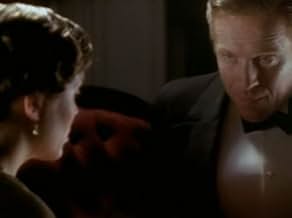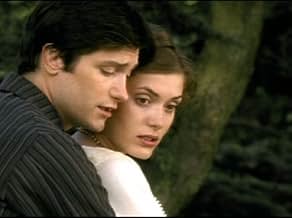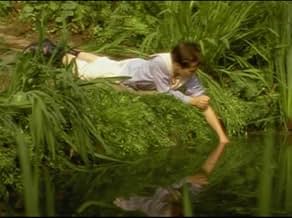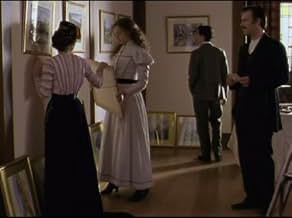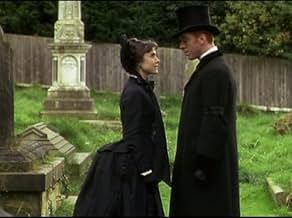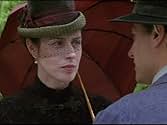Aggiungi una trama nella tua linguaChronicles the lives of three generations of the upper-middle-class British family, the Forsytes, from the 1870s to 1920.Chronicles the lives of three generations of the upper-middle-class British family, the Forsytes, from the 1870s to 1920.Chronicles the lives of three generations of the upper-middle-class British family, the Forsytes, from the 1870s to 1920.
- Ha vinto 1 BAFTA Award
- 2 vittorie e 4 candidature totali
Sfoglia gli episodi
Recensioni in evidenza
A remake of the 1967 original, the 2002 mini-series boasts some fine performances, especially from Band of Brothers' Damian Lewis as the often unfeeling Soames Forsyte, and Gillian Kearney as June Forsyte (the graveyard scene between these two characters is superb!)
The story follows three generations of the Forsyte family, from about the 1880s to the death of Queen Victoria. There is a nice blend of humour, action, and drama to keep the viewer interested in the proceedings. If you're like me and into family sagas, I recommend watching this, or, if you can't, reading the book by John Galsworthy.
The story follows three generations of the Forsyte family, from about the 1880s to the death of Queen Victoria. There is a nice blend of humour, action, and drama to keep the viewer interested in the proceedings. If you're like me and into family sagas, I recommend watching this, or, if you can't, reading the book by John Galsworthy.
The screenwriter has once again decided to rewrite the story. Read the book (actually books) to find out all the differences. For example, in the book the governess leaves on her own & refuses any extra pay, Young Jolyon is seen visiting her flat & the gossip starts - that's when Jolyon's wife and father first learn anything is going on. The changes go on and on. If you have ever seen the 1967 version, it would be hard to beat Eric Porter as Soames.
Comparisons between the 60s version of this splendid work and the latest one are difficult because they were both great. I have really enjoyed the last version especially as regards the performances of Damian Lewis and Gina McKee.
One previous contributor said that he found himself almost liking Soames which 'we were not supposed to do'. Is that right? Galsworthy intended The Forsytes to be representative of the upper middle class with some bad aspects - arrogance, lack of sentiment, conscious always of their respectability - but also with a positive side - sturdy, determined, ambitious, but ultimately concerned with ownership and property. Soames is an extreme example of his kind, to the extent that he regards people - especially his wife - as potential property. Irene, on the other hand, represents the new force which, along with the effects of WWI and the rise of the Welfare State, nationalisation etc will soon overthrow the old order.
Superficially at least, Soames is the villain. He appears to terrorise his wife, physically abuses her and more. However, is there another side to this? Irene marries him quite cynically for materialistic reasons. It's not merely a question of 'not loving' him. He positively makes her flesh creep right from the start. We are given the idea that she is forced to marry him by her stepmother and by her poverty. Force her?? As the story goes forward, we see that she is a strong character - no-one can force her to do anything. Her poverty? She has £50 per annum from her father. This might not seem a lot, but it was about what an artisan earned in a year at that time (on which he was expected to keep a family). Despite his treating her as property, Soames does love Irene in his way and he does try his best to give her what she wants. In return she is openly unfaithful to him, denies him children and even conjugal rights. As regards his bad treatment of her, she certainly returns the compliment in kind. She could be looked on as something of a vampire - she sucks the life force from Soames and old Jolyan and wantonly destroys the happiness of her friend June and Bossiney (though admittedly he goes along willingly). As regards her own son her hatred of Soames tempers her dislike of Fleur so even her son is badly affected by her force of character and neurosis.
I think Galsworthy, as well as writing a simple commentary on Edwardian and Victorian life was also trying to divide his readers into factions - the pro-Soames camp who like the old ways, and the pro-Irene (the 'new woman' camp) who wanted change.
Whatever, I have to congratulate Gina McKee. She carried off that complex character of Irene so well. Her enigmatic Mona Lisa smile, did it display goodness? Or the opposite? I'm still not sure
One previous contributor said that he found himself almost liking Soames which 'we were not supposed to do'. Is that right? Galsworthy intended The Forsytes to be representative of the upper middle class with some bad aspects - arrogance, lack of sentiment, conscious always of their respectability - but also with a positive side - sturdy, determined, ambitious, but ultimately concerned with ownership and property. Soames is an extreme example of his kind, to the extent that he regards people - especially his wife - as potential property. Irene, on the other hand, represents the new force which, along with the effects of WWI and the rise of the Welfare State, nationalisation etc will soon overthrow the old order.
Superficially at least, Soames is the villain. He appears to terrorise his wife, physically abuses her and more. However, is there another side to this? Irene marries him quite cynically for materialistic reasons. It's not merely a question of 'not loving' him. He positively makes her flesh creep right from the start. We are given the idea that she is forced to marry him by her stepmother and by her poverty. Force her?? As the story goes forward, we see that she is a strong character - no-one can force her to do anything. Her poverty? She has £50 per annum from her father. This might not seem a lot, but it was about what an artisan earned in a year at that time (on which he was expected to keep a family). Despite his treating her as property, Soames does love Irene in his way and he does try his best to give her what she wants. In return she is openly unfaithful to him, denies him children and even conjugal rights. As regards his bad treatment of her, she certainly returns the compliment in kind. She could be looked on as something of a vampire - she sucks the life force from Soames and old Jolyan and wantonly destroys the happiness of her friend June and Bossiney (though admittedly he goes along willingly). As regards her own son her hatred of Soames tempers her dislike of Fleur so even her son is badly affected by her force of character and neurosis.
I think Galsworthy, as well as writing a simple commentary on Edwardian and Victorian life was also trying to divide his readers into factions - the pro-Soames camp who like the old ways, and the pro-Irene (the 'new woman' camp) who wanted change.
Whatever, I have to congratulate Gina McKee. She carried off that complex character of Irene so well. Her enigmatic Mona Lisa smile, did it display goodness? Or the opposite? I'm still not sure
I came across "The Forsyte Saga" and its sequel, "The Forsyte Saga: To Let," in my local library. It was the sequel that I had watched first, not realizing there had been a mini-series made prior to this. THE FORSYTE SAGA is an utterly brilliant film, in my opinion, ranging from the exceptional performances of the actors (notably Rupert Graves, Damian Lewis, Gina McKee, Gillian Kearney, & Corin Redgrave), to the screenplay, to the cinematography, to the music (closing theme). The actors executed their portrayals with such realism that I was engrossed in the mindsets of the major players in the film. Such performances are refreshing in the movie industry, as one loses sight of the actors for the "characters." The plot was very good and well written; as such, the movie never seemed to drag. For me, this drama evoked powerful emotions ranging from: deep sorrow & loss (Old Jolyon), to empathy & sympathy, and even a few moments of unexpected humour. I kept wanting more. All in all, this miniseries shows us many injustices, and that dignity, integrity, goodness, and compassion can prevail. If you can set aside an afternoon or long evening to relax and watch the miniseries in one sitting, it will be worth savouring. I hope others find THE FORSYTE SAGA to be a pleasure to watch. I certainly plan to add the DVD set in my film library soon.
I truly enjoyed this mini-series. I felt that Damian Lewis' portrayal of Soames was truly award-winning. After seeing him in other roles (most notably Band of Brothers), I am even more impressed with his range. I also don't agree with those who felt that the Irene' should have been played by a "prettier" actress. I felt that Gina McKee's true beauty was exposed once you looked at the person inside, exactly as Irene's was. I would recommend this to anyone!
Lo sapevi?
- QuizCorin Redgrave (Old Joleyn Forsyte) and Kika Markham (Mme Lamotte) were married in real life
- Citazioni
Soames Forsyte: You know nothing about it. Your friendship with her was a sham!
June: Yes! She stole the love of my life, my future. I should hate her but the alternative was you. I cannot hate her. I can only wonder why she did not do it sooner.
- ConnessioniFeatured in The Best of Masterpiece Theatre (2007)
- Colonne sonoreIrene's Song
(End titles music)
Music by Geoffrey Burgon
Lyrics by Jacqueline Kroft
Performed by Bryn Terfel
I più visti
Accedi per valutare e creare un elenco di titoli salvati per ottenere consigli personalizzati
- How many seasons does The Forsyte Saga have?Powered by Alexa
Dettagli
- Data di uscita
- Paese di origine
- Siti ufficiali
- Lingua
- Celebre anche come
- La saga de los Forsyte
- Luoghi delle riprese
- Croxteth Hall, Muirhead Avenue East, West Derby, Liverpool, Merseyside, Inghilterra, Regno Unito(James and Emily's home)
- Aziende produttrici
- Vedi altri crediti dell’azienda su IMDbPro
Contribuisci a questa pagina
Suggerisci una modifica o aggiungi i contenuti mancanti








